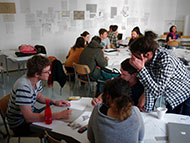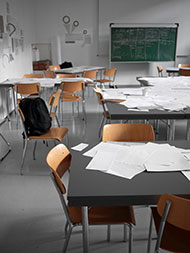courses
The Programme provides an international platform, encourages critical discourse on artistic practice and emphasizes self-reflection and analysis.
The two-year study programme is organized into regular courses, seminars, research projects and tutorials. During the two years, the students attend intensive sessions of courses and seminars for which they complete assigned work and several group projects. Group projects are conceived formally and discursively for public distribution.
Simultaneously to the courses, the students elaborate an independent research project developed during the first year with the support of the seminar Research Best Practices. The second year is distributed and shared into collaborative presentation sessions in consultation with Programme professors and /or with the assistance of external collaborators.
research fields
cursus
The programme founds its practices on critical theory, political thought, postcolonial and gender theories, identity micropolitics, cross-cultural studies, critical economy, political ecology, subcultures, cyberculture and cybermedia, the arts of the contact zone, radical pedagogy, interventionist art practices and tactical media, European syntax, cosmopolitics, and the politics of memory and reconciliation, the art of networks and Internet culture, hybrid forms of distribution and emphasizes research training in art.
Studio investigations and artistic research are realized through the media of technical reproduction as well as through experimental formats and new genres. Art practice is situated, discursive, interventionist, politically engaged and transdisciplinary.
Courses are renewed each year in all three domains that characterize the CCC Research Programme – critical, cross-cultural, cybermedia studies – as well as the research training laboratories.
A detailed programme of courses and a schedule are published at the start of each year.
The two-year Master Programme is organised into regular courses, seminars, research projects, tutorials and co-productions for pursuing individual and group projects. It promotes an organic conception of research and teaching by integrating Master units with laboratory projects.
The first year, students attend intensive sessions of courses and seminars, three days weekly for which they complete assigned work and several group projects. They participate to a research laboratory and regularly present the state of their research and/or collaborative projects.
The second year, Master students attend intensive sessions and participate to several research laboratories within which they develop the different components of their Master Thesis in consultative sessions with professors and visiting lecturers.
units/courses/seminars/laboratories
Critical Studies is preparing students to confront, with critical acuity and creative response, an increasingly complex geopolitical world in mutation. It refers to works of political, economic and legal thinking. The course sources the critical theory of history, Frankfurt School, Marx, Gender Theory, Postcolonial Studies, and critical re-readings in Art History.
Political Studies introduces the current and emerging stakes of a globalized contemporary world with an emphasis on transitional justice, reconciliation politics and memory strategies.
Cross-Cultural Studies references the Birmingham School to examine the epochal phenomena of contemporary cultural history. It introduces a specialized research on the notions of subculture, identity micropolitics, critical pedagogy.
Research: Best Practices offers an introduction to the methodologies of research emphasizing the notion of research through art and initiating research laboratories.
Cybermedia_Net and Network Art participates in the development of Internet culture. It sets out the principles of political thinking in discussion groups and studies technological mutations initiated by the pioneers of cyberspace.
Tactical Media, from macro-history to micropolitics, is taught by artists and activists, reconsiders the issues of strategy and struggle to call into question the limits and potential of politically engaged art.
Situated, Discursive and Interventionist Art Practices explores the role of art in society and considers artistic practice as knowledge production. The course develops critical analytic and visionary strategies and encourages signifying multiform interventions that emerge in a wide range of different media, texts, lectures, ways of living or behaving, and in different institutional sites or communities of civil society. Students engage in independent research and production.
Master Thesis Students construct their theses upon the multimodal results of their collective and individual research. Formats include writings, lectures, and productions realized in the media of technical reproduction. Students are supported to investigate the relation between inquiry and practice, modes of research and production in a specific environment. The work is not only to build great skills of interpretation and refine unique methods of making art, but also, through writing, research, and exhibitions, to learn how to shift fluidly and confidently between analysis and problem solving, between concept and object, and between contemporary art and its histories.
Collective Projects proposes each year projects in collaboration with an institution or a foreign community. On this occasion, the CCC Research-Based Master Programme organizes extra-curricular activities such as cross-disciplinary lecture series, field trips, workshops and public presentations.
Reading Group organizes readings of French and English texts guided by Programme assistants.






